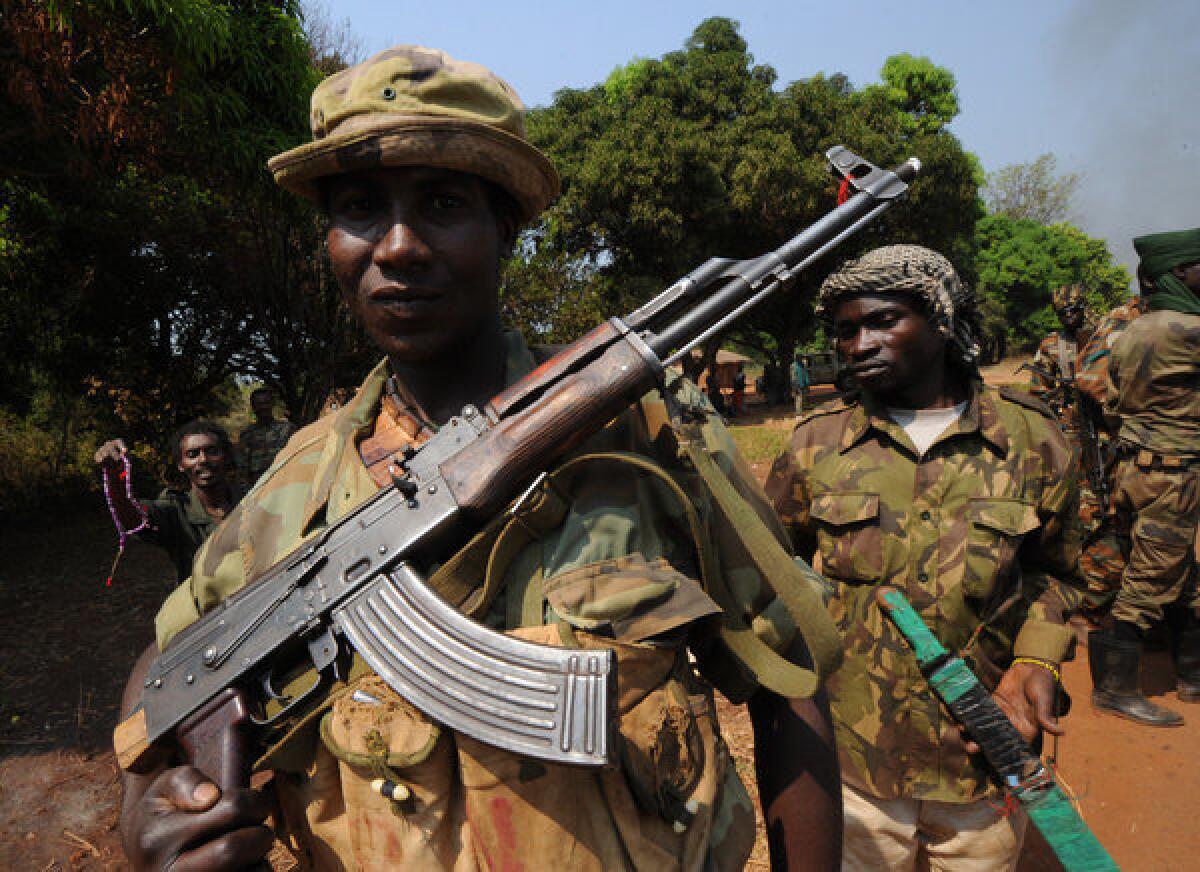Rebels topple Central African Republic president, seize capital

- Share via
JOHANNESBURG, South Africa — Rebels in the Central African Republic ousted President Francois Bozize on Sunday, forcing him to flee as they stormed the capital, seized the presidential palace and took control.
Bozize left the capital early Sunday, AP reported, citing an advisor to the president. He went to neighboring Democratic Republic of Congo, according to news agency reports.
The rebels entered the capital overnight, with heavy fighting reported around the presidential palace. In the hours that followed there were reports of looting and violence by gangs of armed men, with shops closed and residents cowering indoors. Electricity and water was cut.
A statement by the leader of the Seleka rebel alliance, Justin Kombo Moustapha, called for calm and promised a peaceful transition.
A rebel spokesman, Nelson Ndjadder, said in a statement Sunday that the rebels would organize a transition to elections but gave no time frame.
“Central Africans must meet around a table to decide the path for their common future, which will necessarily pass by a consensual management of the transition which, in time, will lead to the organization of democratic elections,” the statement said.
Last week the rebel alliance abandoned January’s short-lived peace deal that allowed Bozize remain in office until the expiration of his term in 2016. They swiftly advanced on the capital, Bangui, claiming that their demands during the peace negotiations, including the release of political prisoners, had not been met.
The January peace deal, brokered by the African Union, established a government of national unity led by a prominent opposition figure, Nicolas Tiangaye, who became prime minister.
It is not yet clear whether Tiangaye’s government will remain in place or whether the African Union may impose sanctions on the country, having warned last year that the organization would not tolerate the rebels ousting the president by force.
France has around 250 troops and 1,250 citizens in the Central African Republic and its forces secured the airport to enable the evacuation of French citizens and others.
The toppling of the president by rebels highlights the inherent instability often present in the unity governments that are the African Union’s usual solution to disputes over power or elections. Governments of national unity, incorporating political opponents in one government, are designed to take the heat out of the struggle for power and put an end to fighting, saving civilian lives. But with opponents running different ministries in one government, the power-sharing deals are often riven with internal conflict or government paralysis, papering over the cracks without resolving underlying issues, leaving disputes to fester and explode some time later.
The resource-rich Central African Republic has seen successive coups and uprisings since independence from France in 1960. Situated in one of the world’s most volatile regions, the country has seen years of misgovernance, corruption and conflict. Most of the population survives on less than two dollars a day despite the country’s treasure trove of minerals and resources, including diamonds, gold, timber and uranium.
Bozize himself seized power in 2003 in a coup, triggering four years of fighting. From 2007, Bozize made peace agreements with various militias. He has twice been reelected, mostly recently in 2010.
Seleka, meaning “alliance,” is a coalition of three rebel groups from the north of the country that staged an uprising in December, swiftly seizing control of a large swath of the country’s north. They accused Bozize of betraying the agreements he made with various rebels from 2007 on. Some analysts say the rebels have support from neighboring Chad, a claim denied by the rebels.
January’s peace deal had allowed Bozize to finish his term. Rebels, opposition figures and Bozize loyalists got portfolios in the government of national unity, but Seleka complained it wasn’t enough.
South Africa deployed several troops to Central African Republic in January to support a regional peacekeeping force there. Six South African soldiers were killed in the weekend fighting, Reuters reported Sunday. The South African authorities have not confirmed their deaths.
ALSO:
U.S. diplomats evacuate Central African Republic as rebels advance
Nigerian author Chinua Achebe, 82, dies
Israeli police dismantle Palestinian protest village
More to Read
Sign up for Essential California
The most important California stories and recommendations in your inbox every morning.
You may occasionally receive promotional content from the Los Angeles Times.










